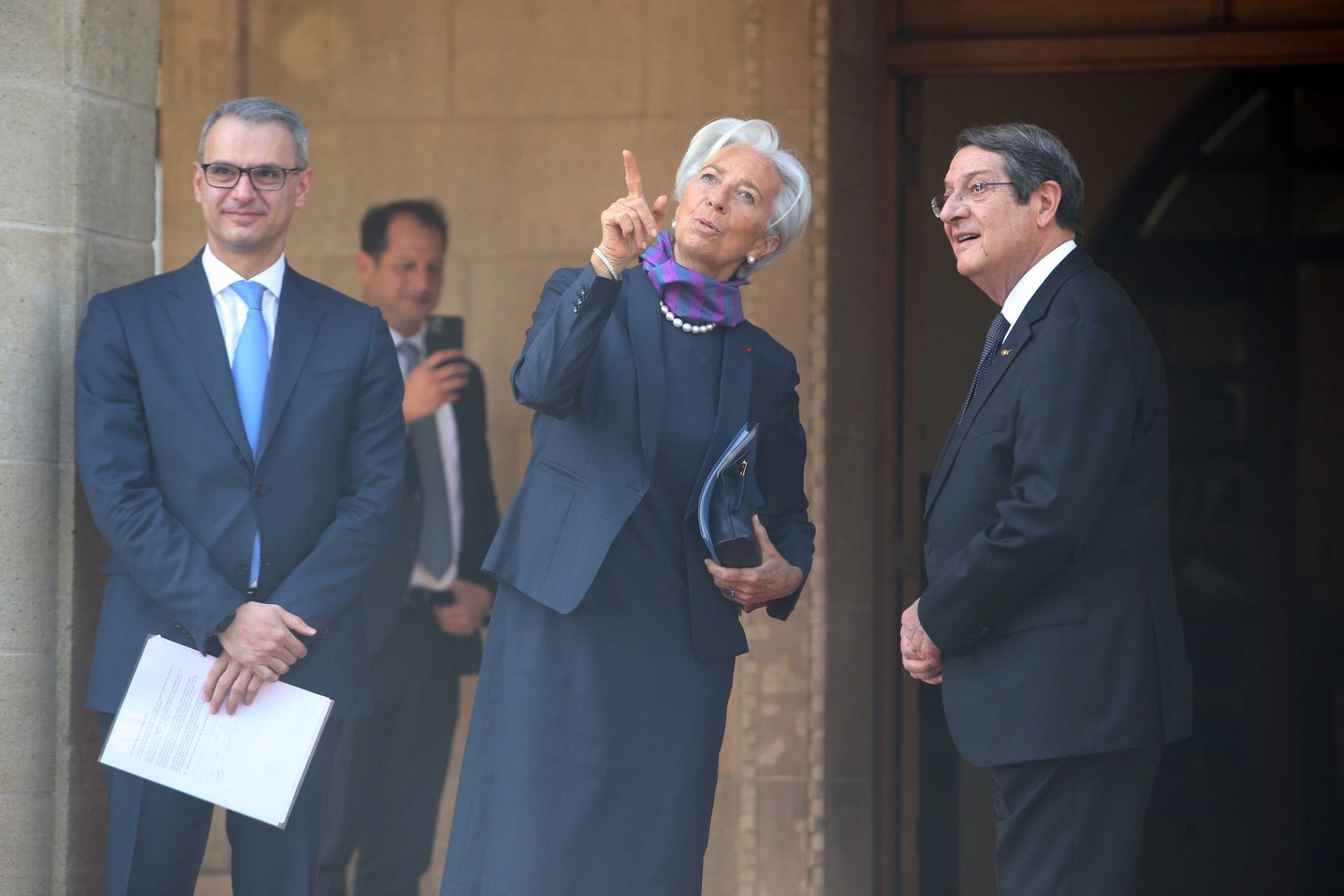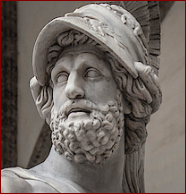PRESIDENT of the ECB, Christine Lagarde got the full red-carpet treatment on her arrival in the regional centre of disappearing banks when she hooked up with her friend since the 2013 haircut, Prez Nik, who was beaming as he welcomed her on the steps of his palace.
The stylish, elegant Lagarde arrived just six days after the announcement of the closure of RCB bank, in which the ECB may have played a significant part, but she was full of praise for the resilience of the Cyprus economy and the strengthening of its banking sector.
Her visit was very close to the ninth anniversary of the closing of Laiki and since then another three banks have closed down in Kyproulla – FBME, the Co-op Bank and finally RCB. Don’t know if this is a good or bad thing, but if Lagarde says our banking sector is now in good shape it must be the former.
People were wondering who had invited the ECB president as the conference she attended on Wednesday was organised by conference organiser IMH rather than the Central Bank of Cyprus (CBC). From what I hear she was the guest of CBC, which had contracted out the organising of the conference to IMH, which reportedly invited many of its corporate clients who wanted to see Lagarde live.
The arrangement may have had something to do with the fact that the governor Constantinos Herodotou and the IMH boss belong to the cabal of English School old boys.
ONE PERSON Lagarde asked to meet during her visit was the former CBC governor Chrystalla Georghadis, who has completely disappeared from public view since leaving her post.
Crystal was included in the list of proposed meetings prepared by the ECB for its president and was submitted to the CBC governor for comments. However, Herodotou, who was Crystal’s successor, removed Crystal’s name from the list of meetings on the grounds that Lagarde would not have the time to meet her.
Lagarde, an active supporter of more women in positions of power, had wanted to meet the only woman to have been CBC governor. Strangely, plenty of time was found for her to meet representatives of three women’s groups, but in the governor’s view, there was no time for Crystal.
She was not even invited to Wednesday’s conference, at which there were more than 300 guests, perhaps because she was not a corporate client of IMH. It goes without saying that she did not receive an invitation to the dinner for Lagarde hosted by Herodotou at the Leventis Gallery.
If a former governor could not get an invitation to a conference attended by more than 300 people, what chance was there of her being invited to a dinner with just 40 guests? Perhaps Herodotou feared he would be outshone by the flamboyant Crystal in front of Lagarde.
CRYSTAL’S shabby treatment by her successor appears to have brought out my repressed feminist side.
I took great exception to Phil’s derogatory report, written by a woman, about Akel deputy Irini Charalambidou’s visit to the US in a delegation of members of the presidency of the Parliamentary Assembly of the Organisation of Security and Cooperation Europe.
The first paragraph of the story said: “At a time when in Nicosia, efforts by the opposition parties for cooperating in the presidential elections are stagnating, with the name of Irini Charalambidou falling even unofficially on the table on behalf of the Greens, the deputy of Akel is in the US having contacts and ‘building’ her presidential profile.”
The rest of the report just refers to the meetings she had at the UN and no explanation provided as to how she was ‘building’ her presidential profile. Even if she were doing this, was she being belittled because she is a woman and has no right to ‘build’ her presidential profile?
Nicos Christodoulides has building his presidential profile for the last nine years, but Phil never once thought it appropriate to mention it.
THERE have been so many stories of Kyproulla lunacy in the last few days our establishment is thinking of changing its name by adopting the title of Charles Bukowski’s book Tales of Ordinary Madness.
What else but madness is it for ministers to insist that Kyproulla needed to attract ‘quality tourism.’ Communications Minister Yiannis Karousos and Deputy Tourism Minister Savvas Perdios repeated this joke at a conference a few days ago, claiming only ‘quality tourism’ would endure in time of continuous crises.
We have been hearing about the need to attract ‘quality tourism’ since the early 90s. If, after 30 years of trying we have still not attracted this quality tourism, it might be time to give up our delusions of grandeur and accept that Kyproulla is not for the discerning, wealthy tourist.
How does a place that has catered to mass tourism for decades become a destination for quality tourism? Will Karousos wave a magic wand and all the ugliness of the Ayia Napa and Protaras tourist strips disappear?
This talk is also very offensive to the millions of non-quality tourists that have been visiting Kyproulla and spending their money here, year in year out. Are we suggesting they are not good enough and we need to replace them with higher quality visitors?
FACED with daily protests by opposition parties and media about the rising prices, the government came up with an ingenious plan to control prices of bread, milk, water, Cyprus coffee, barley and corn.
It has prepared a bill that would allow the commerce minister to set a ceiling on the gross profit margin for the suppliers of the above-mentioned goods. How would this law be enforced? Would the ministry hire a few dozen inspectors to visit businesses to check the books to make sure the business is selling products at prices below the prescribed ceiling set for the gross profit margin?
The bill was welcomed by media as a ‘legal barrier to profiteering’. They did not notice that none of the business organisations protested, which suggests it will never be enforced.
“It was just a bit of government theatre to appease farming organisations which have elections in the coming days,” said a businessman in the know.
MY FAVOURITE tale of ordinary madness is the protest march that will be held by the Confederation of Parents of Secondary Schools and the students’ union Psem on Thursday demanding the scrapping of the twice-yearly exams at secondary public schools.
The parents and their kids have decided that implementation of the first exams had failed and “thousands of students, who have participated in the specific exam procedure, have been victimised.” Only in Kyproulla could we have come up with the notion that students who sit exams at their school are victimised.
Parent and defender of the victimised students, Charalambos Dionysiou, said that the protestors would be demanding “an immediate correction of the distortions that have been recorded in the implementation of the first set of exams”.
What he meant by distortions, only the victimised students could tell us.
UNIONS representing all the public parasites of the country from teachers to cops, in yet another tale of ordinary Kyproulla madness, have written to the finance minister demanding that the income tax threshold be increased from €19,500 to €22,000 and for tax brackets to be raised.
The reason they cited for their just demand was that since 2008 inflation/cost of living had risen by 11.9 per cent. They did not mention by how much the average wage in the public sector had increased in those 14 years, but it is certainly by more than 11.9 per cent; and they were the only workers receiving the cost of living allowance.
They also wanted the state to stop deducting 2.65 per cent from their retirement bonus for Gesy purposes and to reduce the defence tax on interest earnings from 30 to 10 per cent. When you have workers complaining the tax on interest earnings is too high it is emphatic proof they are being grossly overpaid.
MEANWHILE, the movement against foreclosures and the association against the impunity of banks have demanded for a change in the law, in line with the directives of the European Commission, so as to protect people’s right to shelter.
In an announcement, they expressed anger and disappointment over the “exhausting, for people, procedures of loan sales to so-called investment funds and the express foreclosures of residences and family real estate, which they carry out without any opportunity for negotiation, restructuring etc.”
Does the European Commission defend the right to shelter for those who refuse to repay their housing loans? Somehow, I doubt it. As for the “express foreclosures”, the NPLs have ended up with investment firms because the borrowers had not been repaying their loans to the banks for 10 years or longer.
If we were a sane country we would have an association against the impunity of bank loan defaulters, instead of treating them as victims when they did not even have to sit school exams in January.







Click here to change your cookie preferences